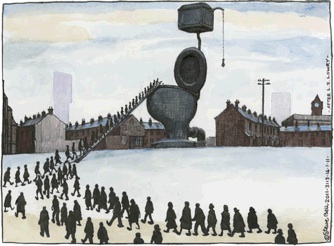Unite to ballot council workers on industrial action
Article published: Monday, January 24th 2011
Employees at Manchester City Council could be the first local authority workforce in the country to be balloted on industrial action, after a resolution advocating action to protect public services was passed at an emergency meeting of the Unite union on 21 January. The development piles pressure on largest union Unison, whose cautious approach to the announcement of job losses is causing frustration among members.
 The resolution calls on the union to take one-day strike action and was passed unanimously. Proposed by a rank-and-file member, it outlined a strategy to resist the 2,000 redundancies that the council is searching to make as part of the drive to slice £110m from its budget in the next year.
The resolution calls on the union to take one-day strike action and was passed unanimously. Proposed by a rank-and-file member, it outlined a strategy to resist the 2,000 redundancies that the council is searching to make as part of the drive to slice £110m from its budget in the next year.
This will involve engaging stakeholders – such as pensioners, single parents, students and those who will be affected by the cuts – in a campaign which is “not just about jobs, but protecting vital public services.” Strike action is to be co-ordinated with a lunchtime demonstration in which all Manchester residents will be invited to participate as part of a wider aim of building public solidarity. The next step will be a democratic decision taken by members through postal ballot.
The emergency meeting was called in response to the crisis which could see one in six workers lose their jobs.
Speakers on the panel seemed resigned to the inevitability of some redundancies given the enormous slashing of the council’s financial settlement from central government. However while stressing that the “way to move forward must be decided by you, the members,” Unite branch convenor Jimmy Thornton added his personal view that unless action is taken “local authorities will come back in the second and third years of this settlement and do the same.”
Consensus for action was strong, with one member declaring from the floor that “we need to go to back to basics. Political parties have abandoned us. We must fight for our communities through the unions.”
There were also warnings from union officials that the number of redundancies could actually reach 3-4,000 if many of those selected are part-time or on lower salary brackets.
The council has set a deadline of March 11 for those wishing to apply for voluntary redundancy or early retirement in order that payroll can be finalised for the coming financial year starting in April. With time of the essence indications are that ballot papers will be delivered to members in early February, making it the first local authority union to consult members on industrial action. One member of the union told MULE that he believed that this would be a test on a national level.
Another topic of discussion which elicited concerns from the floor was the management’s proposed ‘m people’ flexibility agreement. Despite having only been accepted by two of the three unions – Unite members rejected it last December – the council are adamant on forcing it through. Thornton remarked that the council had been “quick off the mark” by designing this policy in anticipation to the cuts, which if implemented will impose ‘generic contracts’ while allowing management complete discretion to redeploy workers to other departments.
Members are also worried that the unresolved issues of ‘capability’ – meaning health and performance problems of employees – and discipline could become covert means of pushing through job losses, and Thornton expressed his fear of the Council taking a more “hardline approach.”
Unite’s move is likely to put the council’s largest trade union Unison under further pressure, whose vociferous words against cuts on a national level have not be equalled by action on the ground.
In the aftermath of the council’s announcement last week of the redundancies Unison’s response was to launch a battlecry against the Coalition government rather than taking the employer to task. Whereas Unite immediately promised a consultative ballot to gauge the feeling among members, Unison have said they will leave open the option of “indefinite strike action” at the eventual juncture of compulsory redundancies. Yet for the time being it appears the leadership wishes to limit itself to negotiation with the council.
This approach has frustrated some members who feel that the union is not doing everything within its power to protect members and public services. One member who did not wish to be named told MULE: “I am very disappointed with the response of the [Unison] union. We have had no communication from them about what is going on, instead they have been drawing up agreements with the council. Rather than fighting the job losses they have gone along with them.”
Voices within the workforce have told MULE that the perceived submission of the union reveals the political strategy of Manchester Unison – to minimise damage to the Labour Party while attacking the Coalition government who they blame for the job losses.
One former Unison organiser at the Council who left the union for what he described as a “lack of backbone” described Unison as “effectively part of the council leadership and…personally and politically very close to the Labour Party. They don’t want to do anything to upset the council. Another problem is that many of the bureaucracy come from middle or senior management – they are clearly not the same level as many of the ordinary workers.
“Their political relationship [with Labour] throws into question their independence and therefore their ability to properly represent their members’ interests with impartiality. But hopefully the move by Unite will push them in the right direction.”
Some are hoping that the direction in which Unite is now moving will provide momentum and result in pressure from grassroots members of other unions to take action. Another Unite member, also formerly of Unison, told MULE that this first step could provide instrumental in bringing unity between the unions and a convergence of approach.
“Unite have to be the fulcrum through which to push forward this movement at the Council. We have to build strong support from all Manchester residents and continuing building [the union].”
A source informed MULE that “the remaining militants” in Unison sent an email at the end of last week demanding that the leadership hold a branch meeting, which is expected to take place today.
Michael Pooler
More: Manchester, News
Comments
-
Sack everyone who stikes. That is perfectly legal.Then advertise their jobs on lower wages and normal benefit pensions.
This would get rid of lots of dead wood and save money.
And this is entirely about jobs. Why do public sector staff insist they are concerned about services? If that were true they’d work harder, be more polite and efficient and take fewer sick days.
Comment by simon on January 25, 2011 at 12:11 pm -
Maybe because their services are available to all, not just those who can afford them? It may be a difficult concept for some to grasp but there is such thing as civic service – as distinct from a commercial one.
Comment by Red Mick on January 26, 2011 at 1:29 am -
yes Simon because its definitely proved that paying your work force only enough so they are barely above the level of poverty, and running it at the point of breaking, definitely leads to a happy world for all.
Comment by Dan Gent on February 2, 2011 at 3:48 pm
While RBS’s chairman gets a £7 million pound bonus while effectively being a public servant (and presiding over the greatest corporate loss in UK history) you have to have the wool pulled pretty hard over your eyes to think that sacking striking public sector workers is justice
The comments are closed.




